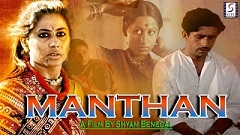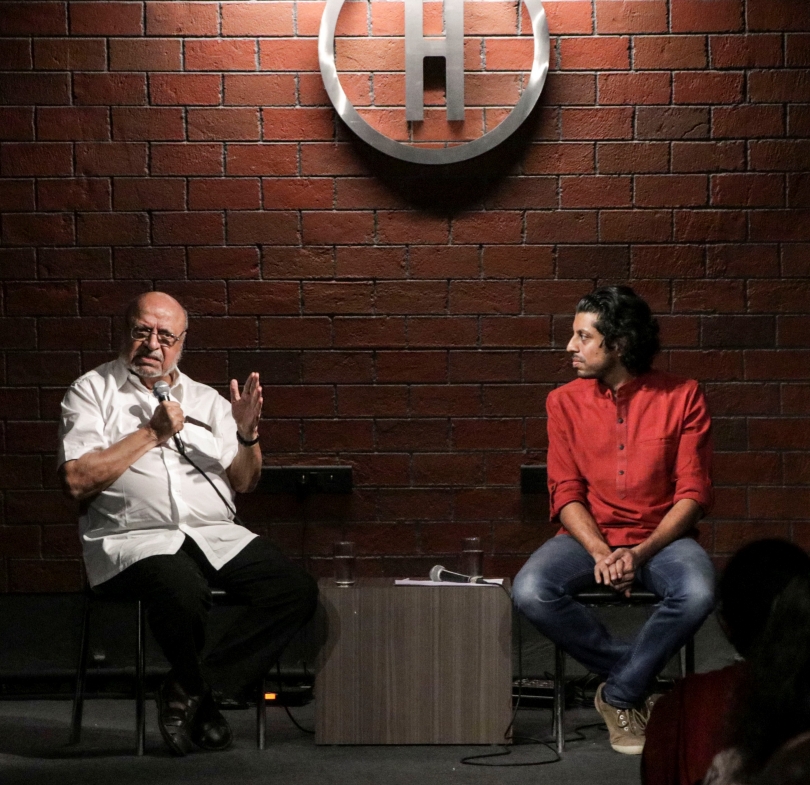|
|
||
|
Pro Tools
FILMFESTIVALS | 24/7 world wide coverageWelcome ! Enjoy the best of both worlds: Film & Festival News, exploring the best of the film festivals community. Launched in 1995, relentlessly connecting films to festivals, documenting and promoting festivals worldwide. Working on an upgrade soon. For collaboration, editorial contributions, or publicity, please send us an email here. User login |
Siraj SyedSiraj Syed is the India Correspondent for FilmFestivals.com and a member of FIPRESCI, the International Federation of Film Critics. He is a Film Festival Correspondent since 1976, Film-critic since 1969 and a Feature-writer since 1970. He is also an acting and dialogue coach. @SirajHSyed  Manthan and the churning of good cinema: Master Class with Shyam Benegal
Manthan and the churning of good cinema: Master Class with Shyam Benegal Standing upright at 82, the one-time swimming champion and one of the foremost directors of Indian cinema, Shyam Benegal, reminisced about the making of his milestone project Manthan (The Churning/1976), in particular, and about films and film-making in general. The occasion was a Master Class, organised on the platform of White Wall Screenings, at the Habitat, Hotel Uni-Continental, Khar, Mumbai. Founded by Balraj Singh Ghai and Pratik Rajen Kothari, WWS has already showcased the work of 120+ film-makers and screened numerous Indie short films, documentaries and indie features! Pratik is the son of reputed director of photography, late Rajen Kothari, and assisted Shyam on the making of Samvidhaan (2014), a 10-part mini-series around the making of Indian Constitution, aired on Rajya Sabha (Upper House of Parliament) TV. Manthan was probably the first crowd-funded film in India, and definitely the first on its scale. It was largely made with the money collected from 500,000 dairy farmers of Gujarat, who contributed Rs. 2 each, to raise Rs. 10,00,000 (ten lakh/one million). An additional Rs. 2,00,000 was raised from alternate sources, so the total budget of the film was Rs. 1.2 million. Though the idea of making Manthan was his, the credit for making it possible goes entirely to Dr. Verghese. Kurien, who headed the co-operative, revealed Benegal.
“Milk was collected from dairy farmers on twice a day basis, and stored at a centralised facility. Farmers were paid in cash, twice a day. Payment for the morning collection was made in the evening and for the evening collection on the next morning. Once convinced about the project, Dr. Kurien sent a message to the farmers that they would be paid Rs. 2 less on a particular collection day, and the money so ‘collected’ would go towards the corpus of making Manthan, which would be their own story.” Why choose a milk-marketing co-operative as the subject of your fourth feature film, having won accolades for your first three films, including Ankur (1974, official Indian entry to the Oscars, National Film Award for Second Best Feature Film) and Nishant (nominated for Palme d'Or, National Film Award for Best Feature Film in Hindi)? In fact, why make a feature film about a milk co-operative at all? It is such a dry subject! “I had already made two documentaries for the Gujarat Milk Co-Op Marketing Federation Ltd. And felt that, to reach a mass audience, we needed to make a feature film. I put it to Dr. Kurien, and, after some thought, he agreed.” But what prompted Dr. Kurien to venture into such a project? Dr. Verghese Kurien attained his degree in B.Sc. in Physics. He went to the United States of America on a government scholarship, where he pursued his degree in Master of Science, in Mechanical Engineering (Distinction). He returned to India, after completion of his studies, and, in 1949, he headed for Anand, a place in the Kaira district of Gujarat, where he was supposed to spend five years as an officer of the Dairy division, in return for the scholarship paid to him by the government. On arriving at Anand, he found that the farmers were being exploited by the distributors of milk, and the entire region was controlled by a shrewd businessman called Pestonjee Edulji, who marketed Polson butter. Looking at the struggle of these people to survive, and mesmerised by the personality of their leader, Tribhuvandas Patel, who was trying to unite the farmers and form a co-operative movement against the exploitation, Dr. Kurien left his government job, and joined forces with Patel and the farmers, to start the Milk Cooperative movement in the region, registered under the name of Kaira District Cooperative Milk Producers Union Ltd (KDCMPUL), which was later renamed to the now household moniker of Amul. He worked towards bringing a White Revolution in India, and executed the much-needed programme of Operation Flood. Under his leadership, India became the largest producer of milk in the world. He died in Anand, in 2012, aged 91. Asked whether Manthan garnered much of an audience, given the subject, Benegal revealed, “It ran for twenty-five weeks in Ahmedabad, attaining the bench-mark of a silver jubilee (something only box-office hits could hope to reach). Dr. Kurien told all the farmers to go to the cities near their villages and watch this film in the theatres there, for it was their own story. Most of them travelled to Ahmedabad on bullock-carts and the roads were jammed. Even in Bombay, where it was released at the Ganga Cinema, right across my office in Tardeo, it ran for 21 weeks. Moreover, it was shown through UNICEF in various countries and even screened at the United Nations General Assembly!” In the film, Dr. Kurien’s personality was the inspiration for the protagonist character, played by Girish Karnad, while the antagonist, most likely based on Pestonjee, was reprised by Amrish Puri. Also in the cast were Naseeruddin Shah and Smita Patil. This was Benegal’s third film with Smita Patil, who was his discovery. A brilliant actress, Smita died an untimely death at the age of 31, in 1986. The Master Class audience was very keen on knowing how he discovered Smita, and Benegal obliged, with a shot-by-shot account. “My sound recordist, Hitendra Ghosh, was a family friend of the Patils. When he found that I had rejected dozens of actresses, he felt that Smita might just be just be the one I was looking for, since he was aware of the concept I had mind. He arranged for an audition, and Smita came down, for a lark. In the very first meeting, I was sure I had found the right girl, but she was not serious about the offer. She thought I was fooling her. When I persisted, she asked me to get permission from her parents. I did that. Then she said, ‘I have my B.A. exam coming up and have no intention of missing them. If you can convince my principal (St. Xavier’s College, Mumbai), I will do the film.’ I went to see the principal, who was a devout catholic priest. He chided me for even attempting to lure his bright student into a world where girls have to ‘dance naked’! But somehow, I convinced him too. Much later, when the film was complete, I showed it to him, and he apologised for being rude to me on the earlier occasion.” Benegal did a total of five films with Smita Patil, the other three being Charandas Chor, Bhumika and Kondura.
Personally, I have vivid memories of Smita, though we hardly spoke at all. Yet, I cannot but recall the electricity that would flow through the News-Room of Bombay Doordarshan Kendra (Television Centre) as soon as she entered. We would often sit across or next to each other, she being a newsreader in the Marathi language and I the first male to read news (in Hindi) on Doordarshan. Though it was nothing more than a Hi and Bye acquaintance, I cherish those moments. Quiet, unassuming, tremendously talented and fluent in Marathi, Hindi and English, that was Smita. Shortly before her passing away, Patil launched her very own play at Bombay's Prithvi Theatre, titled Aap ki Farmaish. It was director Alyque Padamsee's adaptation of German playwright Franz Xaver Kroetz's play without words, Request Concert, about the humdrum existence of an average middle class housewife and to what extent it drives her. Padamsee passed away last year. Shyam Benegal, whose last outing in the feature film arena was Well Done Abba (2010), is one of ten children whose father was a still photographer. “I took to cinema like a fish takes to water. Of course, I was impressed of the films of my growing years, made by directors like John Ford, John Huston and the montage of Sergei Eisentein, my biggest influence was Satyajit Ray. I saw his Pather Panchali twelve times, in consecutive shows, thrice a day, in Calcutta. This was a film and a maker who delivered exactly what was conceived, with no compromises or concerns, other than the compelling narrative.”
Dayal Nihalani, Shama Zaidi, Shyam Benegal and Pratik Rajen Kothari Manthan’s credits include story by Shyam Benegal and V. Kurien, screenplay by Vijay Tendulkar, dialogue by Kaifi Azmi, music by Vanraj Bhatia, lyrics by Niti Sagar and playback by Preeti Sagar. Present on the occasion was Shama Zaidi, who is billed as Art Director, but who wrote most of the dialogue, on location, though it is credited to Kaifi Azmi. Shama later wrote screenplay/dialogue for several of Shyam Benegal’s films. Likewise, Tendulkar’s screenplay was substantially reworked by the unit. Also present at the event was Dayal Nihalani, who was an assistant on Manthan to his brother Govind, Benegal’s cinematographer, and later became a director himself, following in his brother's foot-steps. Pratik Rajen Kothari anchored the proceedings that kept churning for over two hours, and the packed hall was visibly quite in awe of the genius that is Shyam Benegal. 08.01.2019 | Siraj Syed's blog Cat. : Ahmedabad Amul Anand Ankur Balraj Singh Ghai Bhumika Charandas Chor co-operative Dayal Nihalani Dr. Verghese Kurien Govind Nihalani Habitat Hitendra Ghosh Kaifi Azmi Kaira Manthan milk Naseeruddin Shah Nishant Niti Sagar Pestonjee Edulji Polson Pratik Rajen Kothari Preeti Sagar Samvidhaan Shama Zaidi Uni-Continental Vanraj Bhatia Vijay Tendulkar Interviews PEOPLE
|
LinksThe Bulletin Board > The Bulletin Board Blog Following News Interview with EFM (Berlin) Director
Interview with IFTA Chairman (AFM)
Interview with Cannes Marche du Film Director
Filmfestivals.com dailies live coverage from > Live from India
Useful links for the indies: > Big files transfer
+ SUBSCRIBE to the weekly Newsletter DealsUser imagesAbout Siraj Syed Syed Siraj Syed Siraj (Siraj Associates) Siraj Syed is a film-critic since 1970 and a Former President of the Freelance Film Journalists' Combine of India.He is the India Correspondent of FilmFestivals.com and a member of FIPRESCI, the international Federation of Film Critics, Munich, GermanySiraj Syed has contributed over 1,015 articles on cinema, international film festivals, conventions, exhibitions, etc., most recently, at IFFI (Goa), MIFF (Mumbai), MFF/MAMI (Mumbai) and CommunicAsia (Singapore). He often edits film festival daily bulletins.He is also an actor and a dubbing artiste. Further, he has been teaching media, acting and dubbing at over 30 institutes in India and Singapore, since 1984.View my profile Send me a message The Editor |






























